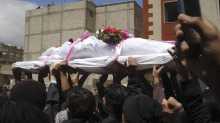From Monday’s Globe and Mail
A regime that fires on unarmed mourners at a funeral for children is sending a message that it will stop at nothing to hold power and rule as it sees fit. This was the message of Libya, and it is, predictably, the message of Syria.
The stage appears set for a prolonged conflict with escalating bloodshed. The Syrian protesters, though they have not yet taken over the public square, as in Egypt, are not likely to be deterred by such extreme violence, or to accept, in these circumstances, the promises of reform offered by the government of President Bashar al-Assad. And Mr. al-Assad’s patrons in Iran are not likely to countenance too many steps toward a democracy.
 In this citizen journalism image made on a mobile phone and acquired Saturday April 23, 2011, by The Associated Press, Syrian anti-government protesters carry the coffin of an activist who was killed on Friday during his funeral procession in Quaboun near Damascus, Syria, Saturday, April 23, 2011. Syrian security forces fired on tens of thousands of mourners during funeral processions Saturday, killing several people following the deadliest day of the uprising against authoritarian President Bashar Assad. (AP Photo)
In this citizen journalism image made on a mobile phone and acquired Saturday April 23, 2011, by The Associated Press, Syrian anti-government protesters carry the coffin of an activist who was killed on Friday during his funeral procession in Quaboun near Damascus, Syria, Saturday, April 23, 2011. Syrian security forces fired on tens of thousands of mourners during funeral processions Saturday, killing several people following the deadliest day of the uprising against authoritarian President Bashar Assad. (AP Photo)
Where to, then? The West is tied up in Libya, as Mr. al-Assad is fully aware. The attacks on Syrian civilians would be a basis for invocation of the responsibility-to-protect doctrine at the United Nations, if only there were plausible means to apply that principle. But in contrast to Libya, there is no distinct region to protect, let alone a rebel army which could benefit from air support. Instead, the Syrian protesters are scattered throughout the country.
The Assad regime is subsidized by Iran, though not enamoured of its theocratic patron. The current crisis, however, is too awkward a time to engineer a switching of allegiances, such as a turn to the West linked to a compromise on the Golan Heights, now governed by Israel. In these circumstances, perplexing as well as horrific, there is no clear way forward.
But Turkey (which not long ago was on bad terms with Syria) may be the country best positioned to do some good. The government of Recep Tayyip Erdogan has made a point of busy diplomatic engagement with numerous – and ideologically diverse – nations. Mr. Erdogan and his colleagues ought to do their best to dissuade the Syrian government from further resort to slaughter. They can present to Mr. al-Assad the example of their own country’s healthy secular democracy with a largely Muslim population – a model that Syria could move toward.
via Turkey may be Syria’s best hope – The Globe and Mail.


Leave a Reply